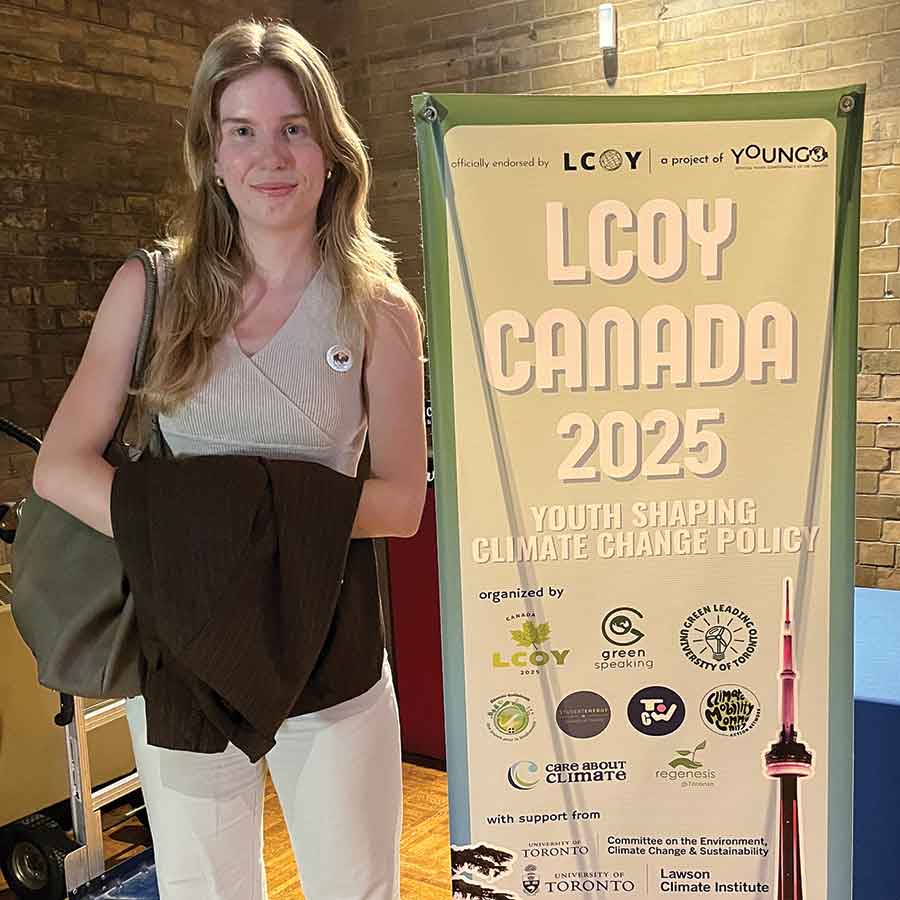Manitoba student Abby Procter, of Woodlands, brought a Prairie perspective to a global conversation on sustainability earlier this month, sharing her vision for an equitable green economy at the Local Conference of Youth (LCOY) in Toronto.

University of Manitoba student Abby Procter speaks at the Local Conference of Youth (LCOY) in Toronto, where she presented her talk Green Growth in a Gray World and contributed to Canada’s national youth statement for COP30
Procter, president of the University of Manitoba Economics Society, delivered a presentation titled Green Growth in a Gray World: Navigating Environmental and Economic Challenges in a Changing Global Landscape to youth delegates preparing for the upcoming United Nations Climate Change Conference (COP).
Her talk explored major gaps in Canada’s climate-finance system and outlined policy tools to help accelerate the renewable-energy transition. She stressed that economic growth and environmental protection must advance together — not in opposition.
“During my two co-op terms with the Government of Canada, I worked on initiatives related to funding programs and Indigenous reconciliation,” said Procter. “With my background in economics, I was drawn to the intersection of these fields through economic reconciliation. The passion my generation holds for a sustainable future motivates me every day to champion a green economy. Manitoba now stands at a pivotal moment to advance sustainable development in the North through Indigenous-led collaboration.”
Procter said equity and justice in climate financing are essential to ensure no community or region is left behind in the transition to cleaner energy. She emphasized the role of economic reconciliation in supporting Indigenous leadership and northern development.
“Economic reconciliation is the reallocation of resource wealth,” she said. “By supporting Indigenous-owned projects, we can promote sustainable development in the North, create meaningful employment and strengthen Manitoba’s overall economic growth. These initiatives also present a unique opportunity to enhance Manitoba’s international standing through strategic projects such as the Port of Churchill and the Northern Corridor.”
The LCOY is part of an international network of youth conferences organized through YOUNGO, the youth constituency to the United Nations Framework Convention on Climate Change. The annual event gathers young leaders for training and dialogue ahead of global climate negotiations.
This year’s Canadian event focused on empowering youth to advocate for climate justice and develop policy recommendations for federal decision-makers.
Procter also helped craft the national youth statement that was formally presented to federal Environment and Climate Change Minister Julie Dabrusin.
“Over the past six years, I’ve dedicated myself to advancing youth engagement in the green economy, and contributing to the national youth statement for COP30 marked a meaningful culmination of that work,” she said. “During the summer, I served as a student analyst with Environment and Climate Change Canada under Minister Julie Dabrusin. I remember preparing research on vegan airport options for her ministerial tour in July, so sharing a conference stage with her was an unexpected and meaningful honour.”
A central message of Procter’s presentation focused on the need to incentivize Indigenous-owned private capital in the renewable-energy sector and embed equity within public policy. During her time with Environment and Climate Change Canada, she contributed to northern policy initiatives, including the Inuit Nunangat Policy, which affirms Inuit rights to their lands and resources.
She said aligning private investment with renewable-energy goals will be critical to Canada’s success.
“A common misconception about the transition to environmentally sustainable projects is that they are inherently unprofitable,” said Procter. “In reality, industries such as mining, energy and construction gain competitive and operational advantages from integrating environmental considerations like Indigenous consultation and sustainable resource management.
“To ensure market profitability and accelerate this transition, public-private partnerships are essential for mitigating risk and mobilizing large-scale investment. Predictable government policies and robust environmental regulations provide the certainty investors need to commit to renewable resource development.”
Procter believes one of the most urgent challenges is improving understanding and accessibility within the field of climate finance itself.
“Ensuring equitable access to education and learning opportunities is essential,” she said. “ ‘Climate finance’ remains a relatively new concept, one that even experienced professionals are still learning to navigate. To move forward, Canada must engage the next generation of policymakers and support initiatives such as the Local Conference of Youth.”
Reflecting on her participation at the conference, Procter said contributing to Canada’s national youth statement and engaging alongside peers from across the country reinforced her optimism about the future.
“Over the past six years, I’ve dedicated myself to advancing youth engagement in the green economy,” she said. “Being part of this national conversation showed how passionate and informed young Canadians are about shaping a more sustainable future.”